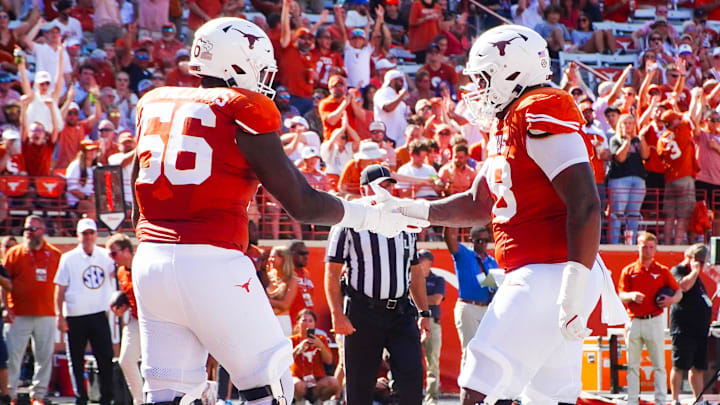How Are Penalties Affecting Texas Football?

Texas' dominant performance over Michigan could have been even better had the offense managed its penalty game.
In the first quarter of Saturday's 31-12 win in Ann Arbor, the Longhorns were forced to stop play on the second play of the game due to a false start. It had seemed like the Big House energy was playing a part in the Horns' early moves. Texas finally made it to the end zone as quarterback Quinn Ewers found DeAndre Moore for a 24-yard touchdown, but once again the move was nullified due to a flag on a holding penalty from Cam Williams.
Though the penalties became a mute point in what was a dominant win for Texas, the penalty problems for Williams were notable.
“We were doing a couple things with motions and shifts in there, and we were kind of sitting at the line of scrimmage, and Cam got a little antsy," Texas coach Steve Sarkisian said. ... “I gave him a big hug, and then DJ Campbell got jealous, so I had to give him a hug, and then Jake (Majors), and then Hayden (Conner) and then Kelvin (Banks Jr.). I had to give all the linemen a hug before the second series to calm everybody down.
Despite several self-inflicted penalties, Texas went into the second half leading 24-3.
The question is how much better could the Longhorns have played without the holds and false starts? Heading into the SEC and playing more high-ranked teams, they can't risk missing potential touchdowns over these mistakes. The biggest takeaway, however, was the ability to recompose. Even after the mistakes happened, the offensive line stayed steady in the run game and pass protection, and was ultimately the deciding factor for the Longhorns' statement win.
“You get three penalties in one drive," Sarkisian said. "I’ve seen a lot of guys melt, but I thought (Williams) stood strong. He got himself recomposed and played a good football game.”
